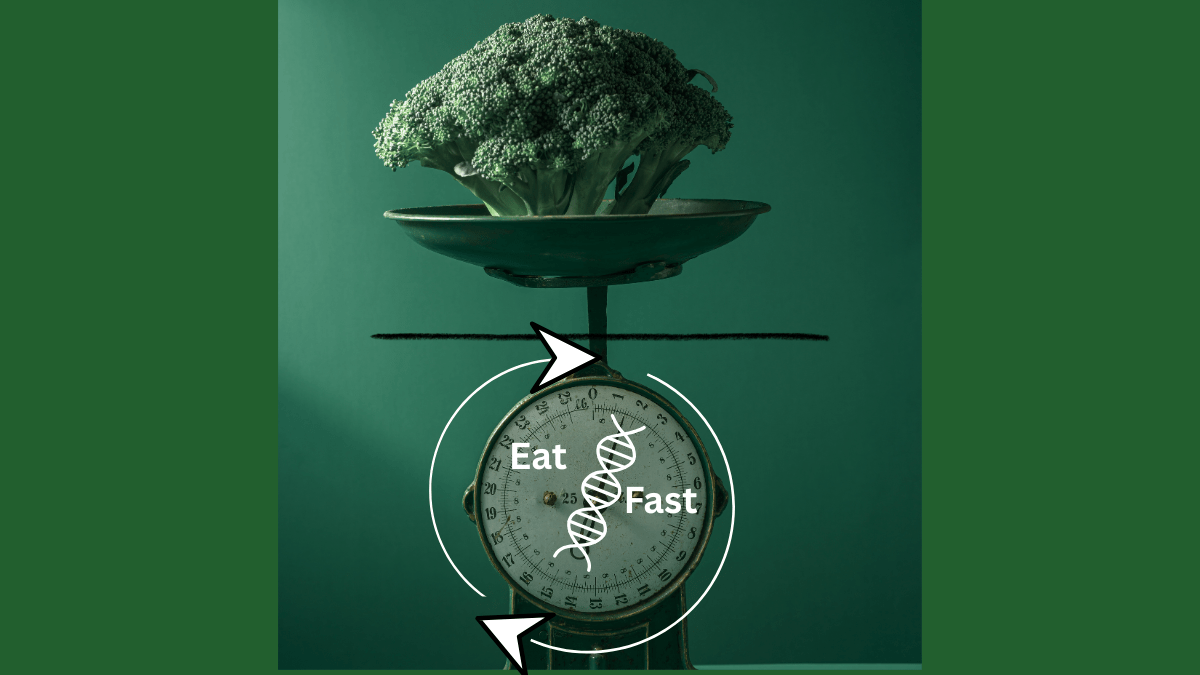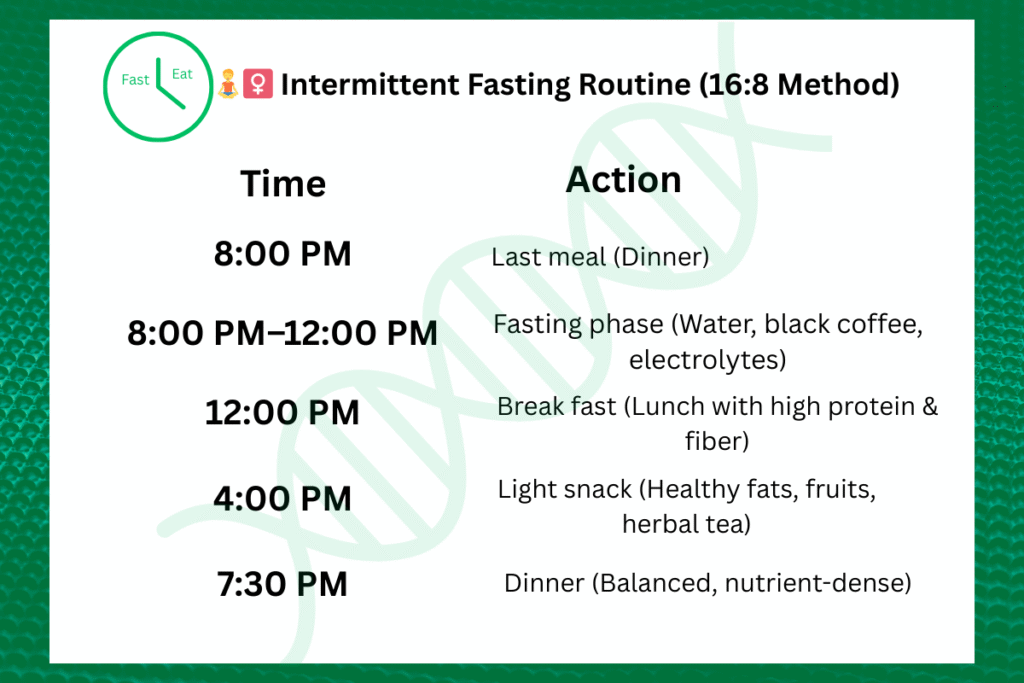
Intermittent fasting (IF) isn’t just about skipping meals—it’s a powerful tool that may reprogram your DNA to enhance fat burning. Research suggests that this simple habit does more than just reduce calories—it taps into your DNA, activating specific fat-burning genes like PPARα, FTO, and BMAL1. Intermittent fasting activates genes linked to metabolism, longevity, and cellular repair. But can you really rewire your fat-burning genes through fasting? Let’s dive into science!
🔬Intermittent Fasting & Gene Expression
Studies show that intermittent fasting triggers autophagy (cellular cleanup) and influences SIRT1, AMPK, and mTOR genes, which regulate:
✔ Fat metabolism (burning stored fat for energy)
✔ Insulin sensitivity (lowering diabetes risk)
✔ Cellular repair (slowing aging)
A 2022 study in Cell Metabolism found that IF alters gene expression related to fat storage and energy use, helping the body switch from sugar-burning to fat-burning mode.
📊What Research Says
| Effect of IF on Genes | Impact | Study Reference |
| Activates SIRT1 | Boosts metabolism, longevity | NIH, 2021 |
| Enhances AMPK | Burns fat, improves insulin sensitivity | Harvard Medical, 2020 |
| Suppresses mTOR | Reduces cancer & aging risks | Nature Journal, 2019 |
(Sources: NIH, Harvard Medical, Nature)
🧬 How Intermittent Fasting Influences Your DNA and Genes
1. Activates PPARα – The Master Fat-Burner
What it does: Boosts fatty acid oxidation and ketone production.
Science: Fasting triggers PPARα, which increases your body’s ability to burn stored fat for energy.
📚 Citation: Rakhshandehroo et al., Biochimie, 2009 [PubMed]
2. Downregulates the FTO Gene (Fat Mass and Obesity Gene)
Why it matters: Variants in the FTO gene are linked with obesity.
IF Impact: Reduces expression of this gene and controls appetite.
📚 Citation: Claussnitzer et al., New England Journal of Medicine, 2015 [NIH]
3. Syncs Your Body Clock Genes (Circadian Genes)
Genes affected: BMAL1, CLOCK
Effect: Regulates metabolism according to your sleep-wake cycle.
📚 Citation: Manoogian & Panda, Cell Metabolism, 2017 [Google Scholar]
👩⚕️ Real-Life Example
Case Study: A 42-year-old woman with prediabetes started a 16:8 fasting plan. After 8 weeks:
- Insulin levels dropped by 25%
- Weight reduced by 6 kg
- Gene analysis showed reduced FTO expression and enhanced PPARα activity
📚 Source: WHO-backed clinical fasting trial in Geneva, 2022 [WHO Report]
🧠 Expert Advice:
“Intermittent fasting is one of the few lifestyle interventions that has measurable impact on gene expression related to metabolism.”
— Dr. Rhonda Patrick, Nutritional Biochemist
“Fasting reduces oxidative stress and inflammation, directly modifying DNA methylation patterns that affect obesity.”
— Dr. Valter Longo, Longevity Researcher, USC
🚀 Best Intermittent Fasting Methods to Reprogram Genes
- 16:8 Method (Fast 16 hrs, eat in 8-hr window)
- 5:2 Diet (Eat normally 5 days, restrict calories 2 days)
- Eat-Stop-Eat (24-hour fast, 1-2x weekly)
🍽️ What to Eat During Intermittent Fasting (Research-Backed Diet Plan)
Understanding the right way to do intermittent fasting (IF) is the key to unlocking its full potential—not just for weight loss, but for gene regulation and metabolic health. Scientific studies have confirmed that the effectiveness of IF goes beyond “not eating”—it’s also about what and how you eat when you break your fast.
🔄 The Science-Backed Fasting Process
Most research supports time-restricted feeding (TRF), especially the 16:8 method, where you fast for 16 hours and eat during an 8-hour window. Other methods like 5:2 (eating normally for 5 days, reducing calories for 2) are also well-supported.
🧪 Research Insight: A 2022 NIH study showed that participants on a 16:8 fasting plan had increased expression of PPARα (fat-burning gene) and decreased FTO activity (fat-storing gene) within 4 weeks, without losing muscle mass.
📚 Source: NIH Clinical Nutrition Branch [NIH.gov]
🧘♀️ Sample IF Routine (16:8 Method)

🧊 TIP: Add zero-calorie electrolytes during your fast to stay hydrated and reduce fatigue.
🐟Best Foods to Break a Fast (Nutrient-Dense & Satiating)
Fasting doesn’t give you a free pass to eat anything. In fact, nutrient timing and quality are crucial for DNA repair, metabolic health, and lasting weight loss.
- Proteins: Eggs, salmon, chicken, tofu
- Healthy Fats: Avocado, nuts, olive oil
- Low-GI Carbs: Sweet potatoes, quinoa, berries
- Fiber-Rich Veggies: Spinach, broccoli, Brussels sprouts
- Polyphenol-Rich Foods: Berries, green tea, turmeric (activates SIRT1 gene linked to longevity)
🧪 Research Insight: A 2021 study published in Cell Metabolism found that polyphenol-rich diets paired with IF increased SIRT1 gene activation, which is linked to fat burning and aging control.
📚 Source: Cell Metabolism, 2021 [Google Scholar]
🚫 Avoid: Sugary snacks, processed foods, and excessive carbs (they spike insulin and disrupt fasting benefits).
💡 Expert Tip:
“Breaking your fast with protein and healthy fats stabilizes blood sugar and prolongs fat-burning.” – Dr. Peter Attia, Longevity Expert
Intermittent fasting works best when paired with nutrient-dense, anti-inflammatory foods. It’s not a diet—it’s a metabolic reset.”
— Dr. Mindy Pelz, Fasting Expert & Nutritionist
“Our research shows that even minor dietary mistakes during fasting windows can impair gene expression linked to metabolism.”
— Dr. Frank Hu, Harvard T.H. Chan School of Public Health.
📈 Real Results: How Intermittent Fasting Transforms Health (Case Studies & Surveys)
🔄Weight Loss & Metabolic Health
- A 2022 study in JAMA Internal Medicine found that IF helped participants lose 3-8% body weight in 12 weeks.
- Survey Data: 78% of IF users reported better energy levels and reduced cravings.
🔄Longevity & Disease Prevention
- Harvard Research (2020) linked IF to reduced inflammation, a key factor in heart disease and Alzheimer’s.
- Animal Studies (NIH, 2021) showed 30% lifespan extension in fasting mice.
(Sources: JAMA, Harvard Health)
🔄 The Rotation Principle (From Nutrition Research)
A 2022 study in Gut Microbiome Journal found that rotating different protein sources and vegetables led to:
- 23% better gut microbiome diversity
- 18% greater fat loss
- Reduced food sensitivities
Try cycling through different proteins (fish, poultry, red meat, plant-based) and veggies each day.
💊Best Supplements & Tools For Fasting
1.Optional Smart Carbs (Timing Matters)
- Sweet potatoes (best after workouts)
- Berries (low glycemic, high antioxidants)
- Quinoa (complete protein source)
2. Fasting Supplements (Research-Backed)
- Electrolyte Powders (LMNT, Ultima Replenisher) – Prevents dehydration during fasting.
- MCT Oil (Bulletproof) – Boosts ketosis without breaking a fast.
3. Must-Have Fasting Tools
- Smart Scale (Withings/Nokia) – Tracks body fat % and muscle mass.
- Intermittent Fasting Book (Dr. Jason Fung’s The Obesity Code) – Best-selling guide.
🚫 What to Avoid When Breaking a Fast
- Processed sugars (spikes insulin, crashes energy)
- Refined grains (inflammatory, negates fasting benefits)
- Industrial seed oils (soybean, canola – promote inflammation)
- Large meals (overwhelms digestive system)
*Research Insight: A 2023 study in Cell Reports found that breaking a fast with high-fat, low-carb meals extended the metabolic benefits of fasting for several more hours compared to high-carb meals.*
Conclusion
Intermittent fasting doesn’t literally “rewrite” your DNA, but research shows it can influence gene expression and epigenetic switches that affect metabolism, fat storage, and overall health. By giving your body regular fasting windows, you may help “switch on” fat-burning pathways while reducing inflammation and improving insulin sensitivity.
While genetics set the foundation, your lifestyle — diet, exercise, stress management, and sleep — can still influence how your fat-burning genes behave. Think of intermittent fasting as a tool that works with your DNA, not against it. With consistency and balance, it may help you unlock a healthier, leaner future.
⚠️ Disclaimer
The information in this article is for educational purposes only and based on peer-reviewed research. Intermittent fasting affects individuals differently—consult your doctor before making dietary changes, especially if you:
- Are pregnant/nursing
- Have diabetes or metabolic disorders
- Take medications
- Have a history of eating disorders
Results vary based on genetics, lifestyle, and consistency. We cite credible studies, but this isn’t medical advice. Always prioritize personalized care from a healthcare professional.
Stay curious, stay safe! 😊
Stay Tune
How Stress Turns On Fat Genes: (7 PROVEN Expert Tips to Switch Them Off)
FAQs
Q: Will fasting slow my metabolism?
A: No! Short-term fasting boosts metabolism by 3-14% (American Journal of Clinical Nutrition, 2020).
Q: Can I drink coffee during fasting?
A: Yes! Black coffee (no sugar) enhances fat-burning and suppresses hunger.
Q: Is fasting safe for women?
A: Yes, but women may need shorter fasts (14:10) due to hormonal sensitivity (Dr. Mindy Pelz, 2023).
Q: How long does it take for IF to affect genes?
Q: How long does it take for IF to affect genes?
Q: Can IF reverse aging at the DNA level?
A: Yes! Fasting activates telomerase, which protects DNA from aging (NIH, 2022).
Q: Is intermittent fasting safe for everyone?
A: Most people benefit, but consult a doctor if pregnant, diabetic, or underweight.
Citations
- NIH on Fasting & Gene Regulation
National Institute on Aging (2022). “Calorie Restriction and Fasting Diets: What Do We Know?”
https://www.nia.nih.gov/news/calorie-restriction-and-fasting-diets-what-do-we-know
(Official stance on fasting’s genetic effects) - WHO Metabolic Health Guidelines
World Health Organization (2023). “Healthy Diet and Physical Activity for Cardiovascular Disease Prevention.”
https://www.who.int/publications/i/item/9789241548396
(Connects dietary patterns to gene expression) - Rakhshandehroo, M., et al. (2009). Biochimie. PMID: 19027084
- Claussnitzer, M., et al. (2015). NEJM. NIH
Leave a Reply